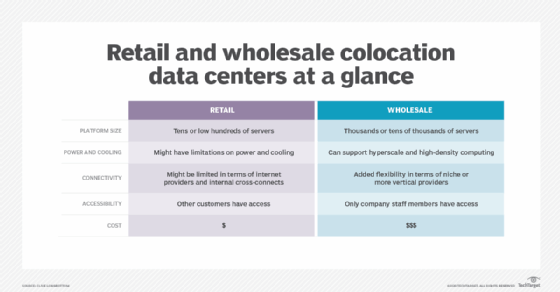Retail colocation vs. wholesale data centers: How to choose
One offers more control, while the other offers more flexible space. If you're considering a colocation facility, how do you decide between wholesale and retail?
Third-party data center facilities come in many shapes and sizes. However, they can be lumped into two main approaches: wholesale and retail.
The differentiation used to be easy to make: a wholesale data center was one where a single customer rented a facility owned by a third party, whereas a retail colocation facility was one where multiple customers were housed in a shared space.
Things aren't quite as easy now, however. Many large data center facility owners are working on a basis of renting out large areas of massive facilities to customers with highly personalized contracts under a pseudo-wholesale approach.
So, what are the real differences, and how should you decide which approach fits your organization best? There are five key factors to take into consideration.
1. Platform size
The first consideration is overall size. If your organization is looking at a few tens or low hundreds of servers built up from standard commercially available systems, then retail is probably a better direction to go. There is little need for considerations around power density and distribution; the approach of a retail colocation center where such matters are pretty much dictated in the standard contract will generally be sufficient.
Most wholesale facility owners have a minimum power usage requirement to make having you as a customer worth their while -- 300 kW is around the floor, with 1 MW and above being the sweet spot.
Thousands or tens of thousands of servers might need a more flexible design approach: multiple power distribution systems, targeted cooling to possible hot spots and more in-depth environmental monitoring might point to the need for a wholesale contract where such areas can be personalized as to the customer's needs.

2. Power and cooling
Hyperscale and high-density computing is a prime example where wholesale data centers might be necessary. Most retail colocation facilities have a ceiling as to the power that can be provided to any specific area and to the facility as a whole.
Providing sufficient power for extremely dense platforms such as supercomputers or highly tuned systems with optimized servers, GPUs and other dedicated compute engines can require power densities that are well above those that a retail facility can easily match. Even if the retail facility owner can be persuaded to provide sufficient power, it will be outside of their core competency and might not be supported to the levels that the customer needs.
This also has an effect on auxiliary power backup: Many wholesale facility users need 100% uptime for the total platform, whereas many aspects of a platform in a retail environment can be tiered as to whether they must be available 100% of the time or can be allowed to fail gracefully if power availability is impacted for a period of time -- or if 100% availability is cost-prohibitive. Far better to use a wholesale facility where such power distribution needs can be designed in from the beginning and meaningful support can be included in the contract.
The flip side of sufficient power provision is, of course, the availability of sufficient cooling, and this might be more of a problem for a standard retail facility. Cooling is, generally, built to support the overall facility; it isn't easy to retrofit extra cooling capabilities to support a single customer. Wholesale providers will generally be able to provide specific cooling as required by the customer as part of the original design and build function.
3. Connectivity
Another area that has changed is connectivity. Historically, wholesale facility providers owned and managed the facility, power and cooling, along with building information management systems. Connectivity was something the customer dealt with, as it was part of the overall platform design under their control.
Now, however, connectivity is a core part of any data center facility owners' skills; as such, there is likely little difference in internet connectivity capabilities between wholesale and retail -- although, wholesale might provide greater flexibility for some niche or more vertical providers. Certainly, most wholesale providers will allow a customer to bring in its own internet provider, whereas not all retail providers will.
There is also the question of internal cross-connects. Again, this is an area where the differences between wholesale and retail are narrowing. It used to be that wholesale facilities didn't bother with internal cross-connects, as it was down to the customer. Retail providers saw a need to provide good internal cross-connects so customers could make use of available services from other users of the same platform, plus integrated third-party services from major clouds such as AWS and Azure.
Now, both groups must support high-performance internal and external cross-connects, but wholesale allows more flexibility.
4. Staff accessibility
A single-customer wholesale facility will only allow the customer and the facility owner's staff inside it, and the customer can insist that all facility owner's employees are vetted.
In a retail space, each customer will have to accept that staff from many other customers will be allowed in, and they will have to take whatever steps they deem necessary to shield their equipment within screened-off cages to provide sufficient security.
5. Cost
Obviously, such personalization of services comes at a price -- and this is the area where many organizations find that wholesale isn't for them. Essentially, what wholesale facility users are doing is creating their own data center environment, either as the sole user of a facility that is managed by a third party or as one of just a few users. Even where the facility is shared, the costs might not be shared equally; each customer's requirements around power, cooling, connectivity and auxiliary power availability might be different with different upfront and ongoing costs.
Overall, the choice for most organizations will come down to a mix of size and cost. Most organizations will find the simplicity and cost of a retail colocation facility good enough for their needs. For those with hyperscale, supercomputing or other specific needs, a wholesale approach might be needed -- if the organization can afford it.
Dig Deeper on Data center ops, monitoring and management
-
![]()
Datacentre operators ‘hesitant’ over how to proceed with server farm builds as AI hype builds
-
![]()
Kao Data unveils Tier II datacentre strategy by pledging to open Manchester facility in late 2025
-
![]()
Castrol to open datacentre immersion cooling test facility at Berkshire HQ
-
![]()
Kao Data expands Harlow datacentre campus by opening second 10MW facility




